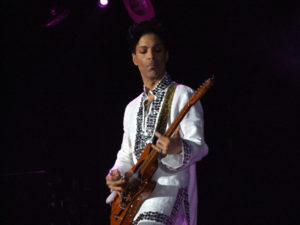2011 Back2Black Festival in Rio in August
By Patricia Maresch, Senior Contributing Reporter
RIO DE JANEIRO, BRAZIL – While Rio is preparing itself for the Rock in Rio Festival in late September and early October, another music festival with big international guests is already on its way: Back2Black. The African roots, music and cultural heritage festival takes place the last weekend of August at the old train station Leopoldina and is a celebration of African rhythms, sounds, colors, styles and social and economic consciousness.

Prince will perform in Rio August 27th, photo by I Do Shows/Flickr Creative Commons License.
Undoubtedly, the festival’s highlight will be the performance of the American musician Prince on Saturday the 27th. “I am so excited that Prince is coming to Brazil, I think I’ve waited my whole life for this moment,” says 32-year-old Prince fan Guilherme. It has been twenty years since Prince has last performed in Brazil, at the 1991 edition of Rock in Rio.
It’s Back2Black Festival’s third edition this year, bringing great names of Black culture to Rio de Janeiro for concerts, debates and exhibitions, on four different stages. Besides Prince, there will also be other international artists performing, such as Chaka Khan, Macy Gray and Aloe Blacc.
One of the four stages will be entirely dedicated to Afro-Brazilian artists with music from Moreno Veloso, Domenico Lancelotti and a special performance from the band Paraphernalia with rapper BNegão. Brazilian superstar Seu Jorge will also be performing at the Back2Black Festival.
Seu Jorge gained world fame for his acoustic versions of old David Bowie songs in the film The Life Aquatic with Steve Zissou directed by American filmmaker Wes Anderson.

Macy Gray is performing August 26th in Rio, photo by Programação Back2Black Festival 2011.
Brazilian culture has strong African roots and the Back2Black Festival wants to show how the African influences affect Brazilian contemporary culture. “Our African roots have been ignored for several decades,” says festival organizer Connie Lopes.
“The Back2Black project was therefore created out of the urge to redo bridges, giving Africa back to Brazil,” she adds. Last year’s edition was a huge success with performing artists Erykah Badu and Carlinhos Brown.
Tickets for the festival went on sale two weeks ago and vary from R$100 for a day pass to R$250 for a ticket to see Prince. “It’s kind of pricey, but it will be totally worth it,” says English teacher Thiago. “It’s kind of a unique experience to see Prince perform at this very special Leopoldina venue.”
According to O Globo’s gossip column Prince has said that none of the festival employees are allowed to drink alcohol when they are working with him. The artist became a Jehovah’s Witness in 2001.
Prince has supposedly invited the famous architect Oscar Niemeyer to attend his concert at the Back2Black festival, the same gossip column wrote. The last time Prince – a fan of architecture – was in Rio he had also tried to meet the 103-year-old Niemeyer but the architect was traveling at the time.
For more information about tickets and programming, see the official festival site.
